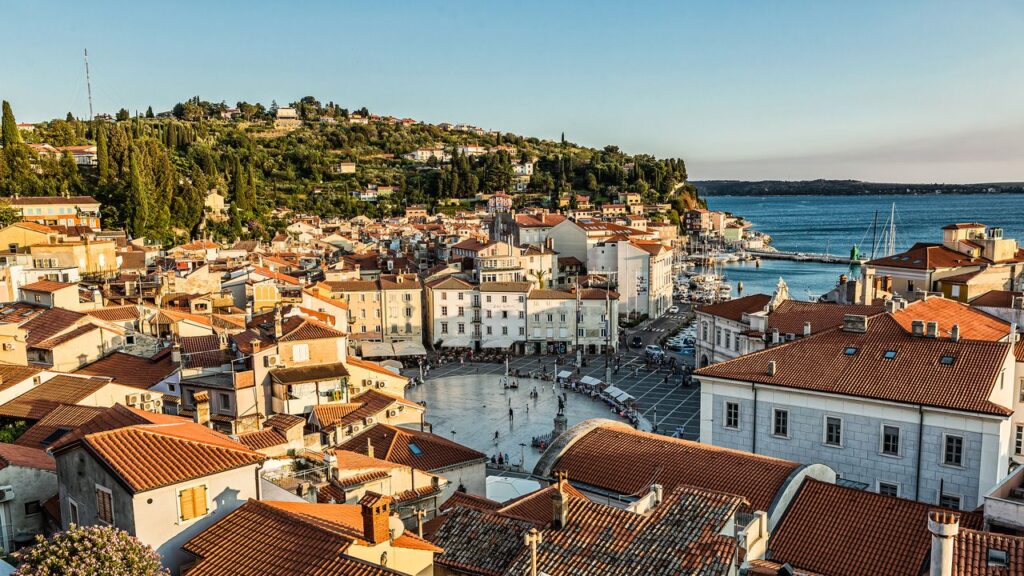Remote workers interested in living among Central Europe’s glacial lakes, pristine mountains, and scenic medieval towns can soon do so using a new digital nomad visa.
Slovenia has just announced that this fall, it will be launching a digital nomad visa for the first time ever. The EU nation shares its borders with Italy, Austria, and Croatia and is known for its stunning landscapes and rich cultural traditions such as historic wineries and intricate lace weaving.
Slovenia’s digital nomad visa is set to launch on November 21, 2025, according to information from immigration firm Fragomen. Eligible remote workers will be able to live in Slovenia for up to one year, but they must work for a foreign-based company. That means that if you’re a freelancer or self-employed, you can only work with clients outside of Slovenia. Remote workers who are employees or contractors for companies based outside of the country are also eligible.
Travelers will have to prove they meet an income requirement as part of the application by submitting pay stubs, freelance or other work contracts, or bank statements, Euro News reports. However, the minimum income required has not yet been released. The digital nomad visa will be non-renewable, meaning that once the permit expires, travelers will need to spend at least six months outside the country in order to reapply.
Slovenia is a member of the EU, so the new visa will be available only for non-EU and non-EEA nationals. Recipients will also be allowed to bring their families along with them, but family members are not permitted to work for Slovenia-based companies either. In a huge plus for travelers, Slovenia is notably a member of the Schengen Area, meaning that visa recipients will be able to visit any of the 29 member countries for up to 90 days at a time without additional paperwork.
When the visa rolls out, travelers will be able to submit applications online or in person at a Slovenian consulate or embassy.
Slovenia has a wealth of benefits to offer remote workers. The nation’s largest city is its capital, Ljubljana, known for its outdoor cafes, numerous parks and museums, baroque architecture, and the scenic Ljubljanica River. The city also offers many highly rated co-working spaces.
Outside of Ljubljana, one of the best-known towns in Slovenia is Bled, known for its eponymous Alpine lake and the medieval castle standing along its shore. But there’s much else to do and see across the country. Slovenia has a small sliver of Adriatic coastline on its western border, a nearly 30-mile swathe offering pebble beaches, working salt pans, and historic towns like Piran and Koper, which were once ruled by the Venetian empire. The country also boasts beautiful wine regions such as Goriška Brda—sandwiched between the Julian Alps and the Mediterranean, the rolling green vineyards are often compared to the landscapes of Tuscany. For fans of mountain sports, Slovenia is home to affordable ski resorts and natural wonders like Triglav National Park, where you can enjoy hiking, cycling, kayaking, and even rafting.
Compared to the US, the nation has a favorable cost of living, according to data from financial analysis site Numbeo: The overall cost of living in Ljubljana is 47% cheaper than in New York City, per Numbeo’s index. Daily costs in Ljubljana are significantly more affordable than those in New York, with the average rent nearly 74% cheaper compared to rent in NYC, while groceries and restaurants clock in at 50% and 46% more affordable, respectively.
An increasing number of travelers have added Slovenia to their European travel itineraries. Tourism to the country has been on the rise, particularly this summer, with 2025’s seasonal bookings surging by 473% compared to last year, according to data from luxury travel platform Virtuoso.
When the permit launches, Slovenia will join a growing list of European countries that offer digital nomad visas, including Greece, Portugal, Spain, Italy, Malta, Croatia, and the Czech Republic. Most of the comparable European programs offer similar terms to Slovenia’s forthcoming visa, with digital nomads allowed to stay in each nation for about one year.
https://www.cntraveler.com/story/slovenia-is-launching-a-digital-nomad-visa-this-fall


